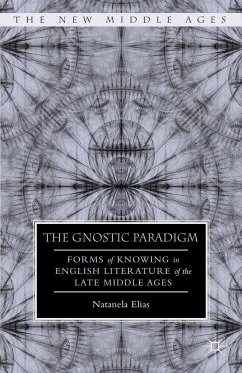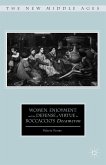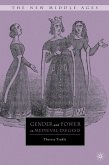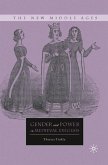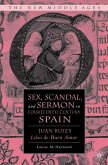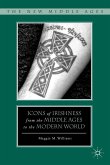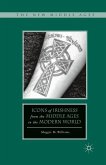No study has been carried out examining the gnostic undercurrents in medieval England. For the first time, Natanela Elias investigates the existence of these gnostic traces, using prominent late medieval English literary works such as Piers Plowman and Confessio Amantis and ultimately shedding light on a previously overlooked religious dimension.
"Natanela Elias's The Gnostic Paradigm illuminates a little understood but often felt dimension of late medieval literature. Gnosticism is essential to Western culture and its shadow must be grasped by whoever seeks historical self-understanding. Through careful examination of the spectral gnostic presence in Middle-English texts, this study reveals the wisdom of its hidden light, suggesting how much darker our world would be without it.' Nicola Masciandaro, Professor of English, Brooklyn College, CUNY, USA
"The Gnostic Paradigm traces a rich vein of Gnosticism through Christian thought and late medieval English literature. This study offers exciting new readings of the work of the Pearl poet, William Langland's Piers Plowman, and John Gower's Confessio Amantis readings that suggest that these widely-studied texts may be less orthodox than has previously been assumed." - Professor Diane Watt, Head of School of English and Languages, University of Surrey, UK
"The Gnostic Paradigm is a very persuasive and important book that deepens our knowledge of the survival of 'gnostic-like' ideas in late medieval English literature. It is sure to stimulate much discussion and encourage additional research. Those whose research interests are in medieval English literature and Gnosticism will benefit a great deal from this work; it is a must in any personal or institutional library." - Alberto Ferreiro, Seattle Pacific University
"In The Gnostic Paradigm, Natanela Elias introduces a unique political response to the dominance of Christian discourse in the study of medieval literature. Her dynamic reach toward the ancient Gnostic residues that she finds within concepts of medieval orthodoxy complicates views of institutional discourses as well as their generic and historical locations. Elias' book is an important intervention in the study of late medieval literature, its traces, and its futures." - Erin Felicia Labbie, Associate Professor ofEnglish, Bowling Green State University, USA
"The Gnostic Paradigm traces a rich vein of Gnosticism through Christian thought and late medieval English literature. This study offers exciting new readings of the work of the Pearl poet, William Langland's Piers Plowman, and John Gower's Confessio Amantis readings that suggest that these widely-studied texts may be less orthodox than has previously been assumed." - Professor Diane Watt, Head of School of English and Languages, University of Surrey, UK
"The Gnostic Paradigm is a very persuasive and important book that deepens our knowledge of the survival of 'gnostic-like' ideas in late medieval English literature. It is sure to stimulate much discussion and encourage additional research. Those whose research interests are in medieval English literature and Gnosticism will benefit a great deal from this work; it is a must in any personal or institutional library." - Alberto Ferreiro, Seattle Pacific University
"In The Gnostic Paradigm, Natanela Elias introduces a unique political response to the dominance of Christian discourse in the study of medieval literature. Her dynamic reach toward the ancient Gnostic residues that she finds within concepts of medieval orthodoxy complicates views of institutional discourses as well as their generic and historical locations. Elias' book is an important intervention in the study of late medieval literature, its traces, and its futures." - Erin Felicia Labbie, Associate Professor ofEnglish, Bowling Green State University, USA

